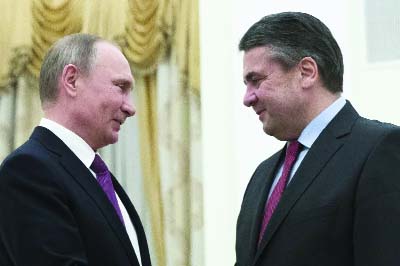
AP, Moscow :
Russian President Vladimir Putin has told the visiting German foreign minister that he would like to improve ties between the two countries that were soured by the Ukraine crisis.
Russia’s annexation of Crimea in 2014 and support for separatist rebels in eastern Ukraine put a strain on a traditionally warm relationship.
Putin on Thursday received German Foreign Minister Sigmar Gabriel and extended an invitation for Chancellor Angela Merkel to visit Moscow. Gabriel had met with his counterpart Sergey Lavrov earlier in the day.
Putin told Gabriel in remarks carried by Russian news agencies that that it is “our common goal to fully normalize the relations and to make sure all the difficulties we face are overcome.”
Merkel has been a staunch supporter of Ukraine’s territorial integrity, which has irked Moscow.
A German diplomat who traveled with Gabriel and asked to be unnamed because he was not authorized to speak publicly described the two-hour talks as “lengthy, good and intensive.”
He said Putin and Gabriel discussed bilateral issues, as well as the conflict in eastern Ukraine and how to ensure compliance with a cease-fire agreement between the Ukrainian government and separatist rebels that Germany and Russia brokered.
Meanwhile, Russian President Vladimir Putin hosted Israeli Prime Minister Benjamin Netanyahu on Thursday for talks focusing on the situation in Syria and Israeli concerns about the role of Iran and its proxies there.
Greeting Netanyahu at the start of their Kremlin negotiations, Putin emphasized a high level of trust between them. Netanyahu’s visit to Moscow follows his talks last month with U.S. President Donald Trump.
Netanyahu praised Russia’s role in fighting the Islamic State group and other radical militants in Syria. At the same time, he raised strong concern about the presence of Iranian and Hezbollah forces in Syria.
“Of course, in the past year, there was significant progress in the fight against the radical Sunni Islamic terrorism led by Daesh and al-Qaida,” Netanyahu said, using the Arabic acronym Daesh to refer to the Islamic State group. “Russia has made a very important contribution. Naturally, we do not want this terrorism to be replaced by the radical Shiite Islamic terrorism led by Iran.”
Russia has sided with Iran and Hezbollah in helping support Syrian President Bashar Assad, but at the same time it has maintained warm ties with Israel. The two nations have coordinated their actions to prevent any possible incidents between their militaries in Syria.
Russian President Vladimir Putin has told the visiting German foreign minister that he would like to improve ties between the two countries that were soured by the Ukraine crisis.
Russia’s annexation of Crimea in 2014 and support for separatist rebels in eastern Ukraine put a strain on a traditionally warm relationship.
Putin on Thursday received German Foreign Minister Sigmar Gabriel and extended an invitation for Chancellor Angela Merkel to visit Moscow. Gabriel had met with his counterpart Sergey Lavrov earlier in the day.
Putin told Gabriel in remarks carried by Russian news agencies that that it is “our common goal to fully normalize the relations and to make sure all the difficulties we face are overcome.”
Merkel has been a staunch supporter of Ukraine’s territorial integrity, which has irked Moscow.
A German diplomat who traveled with Gabriel and asked to be unnamed because he was not authorized to speak publicly described the two-hour talks as “lengthy, good and intensive.”
He said Putin and Gabriel discussed bilateral issues, as well as the conflict in eastern Ukraine and how to ensure compliance with a cease-fire agreement between the Ukrainian government and separatist rebels that Germany and Russia brokered.
Meanwhile, Russian President Vladimir Putin hosted Israeli Prime Minister Benjamin Netanyahu on Thursday for talks focusing on the situation in Syria and Israeli concerns about the role of Iran and its proxies there.
Greeting Netanyahu at the start of their Kremlin negotiations, Putin emphasized a high level of trust between them. Netanyahu’s visit to Moscow follows his talks last month with U.S. President Donald Trump.
Netanyahu praised Russia’s role in fighting the Islamic State group and other radical militants in Syria. At the same time, he raised strong concern about the presence of Iranian and Hezbollah forces in Syria.
“Of course, in the past year, there was significant progress in the fight against the radical Sunni Islamic terrorism led by Daesh and al-Qaida,” Netanyahu said, using the Arabic acronym Daesh to refer to the Islamic State group. “Russia has made a very important contribution. Naturally, we do not want this terrorism to be replaced by the radical Shiite Islamic terrorism led by Iran.”
Russia has sided with Iran and Hezbollah in helping support Syrian President Bashar Assad, but at the same time it has maintained warm ties with Israel. The two nations have coordinated their actions to prevent any possible incidents between their militaries in Syria.

